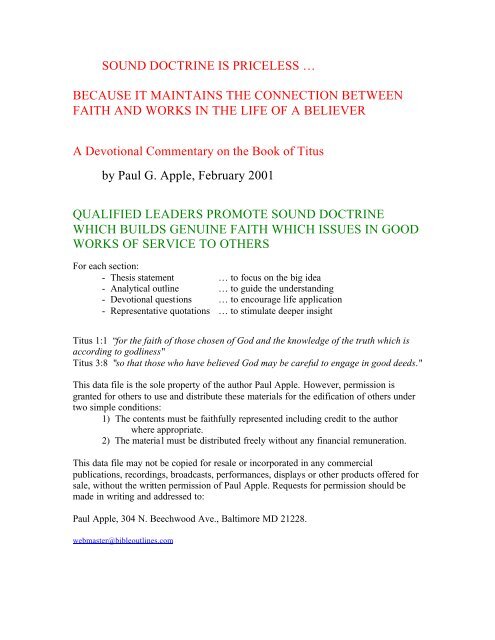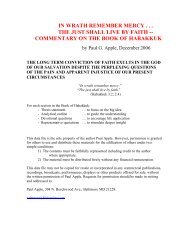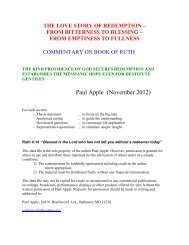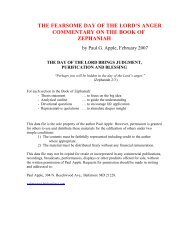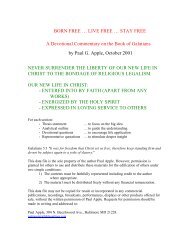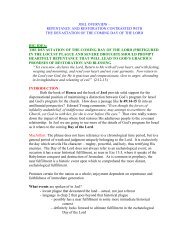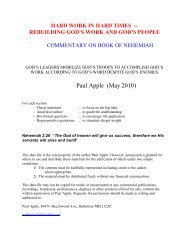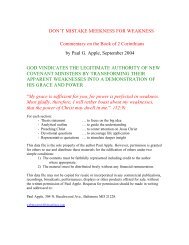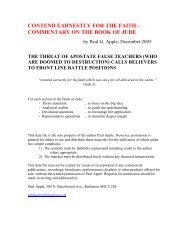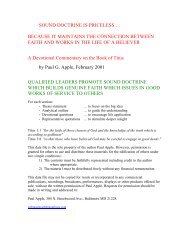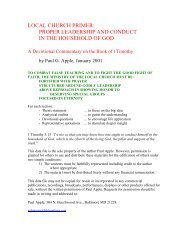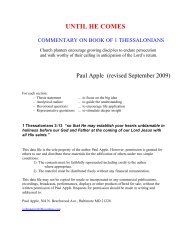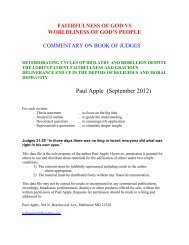to download the full commentary in PDF format. - Free sermon ...
to download the full commentary in PDF format. - Free sermon ...
to download the full commentary in PDF format. - Free sermon ...
- No tags were found...
You also want an ePaper? Increase the reach of your titles
YUMPU automatically turns print PDFs into web optimized ePapers that Google loves.
SOUND DOCTRINE IS PRICELESS …BECAUSE IT MAINTAINS THE CONNECTION BETWEENFAITH AND WORKS IN THE LIFE OF A BELIEVERA Devotional Commentary on <strong>the</strong> Book of Titusby Paul G. Apple, February 2001QUALIFIED LEADERS PROMOTE SOUND DOCTRINEWHICH BUILDS GENUINE FAITH WHICH ISSUES IN GOODWORKS OF SERVICE TO OTHERSFor each section:- Thesis statement … <strong>to</strong> focus on <strong>the</strong> big idea- Analytical outl<strong>in</strong>e … <strong>to</strong> guide <strong>the</strong> understand<strong>in</strong>g- Devotional questions … <strong>to</strong> encourage life application- Representative quotations … <strong>to</strong> stimulate deeper <strong>in</strong>sightTitus 1:1 “for <strong>the</strong> faith of those chosen of God and <strong>the</strong> knowledge of <strong>the</strong> truth which isaccord<strong>in</strong>g <strong>to</strong> godl<strong>in</strong>ess"Titus 3:8 "so that those who have believed God may be careful <strong>to</strong> engage <strong>in</strong> good deeds."This data file is <strong>the</strong> sole property of <strong>the</strong> author Paul Apple. However, permission isgranted for o<strong>the</strong>rs <strong>to</strong> use and distribute <strong>the</strong>se materials for <strong>the</strong> edification of o<strong>the</strong>rs undertwo simple conditions:1) The contents must be faith<strong>full</strong>y represented <strong>in</strong>clud<strong>in</strong>g credit <strong>to</strong> <strong>the</strong> authorwhere appropriate.2) The material must be distributed freely without any f<strong>in</strong>ancial remuneration.This data file may not be copied for resale or <strong>in</strong>corporated <strong>in</strong> any commercialpublications, record<strong>in</strong>gs, broadcasts, performances, displays or o<strong>the</strong>r products offered forsale, without <strong>the</strong> written permission of Paul Apple. Requests for permission should bemade <strong>in</strong> writ<strong>in</strong>g and addressed <strong>to</strong>:Paul Apple, 304 N. Beechwood Ave., Baltimore MD 21228.webmaster@bibleoutl<strong>in</strong>es.com
ABOUT THE AUTHORPaul majored <strong>in</strong> English at Pr<strong>in</strong>ce<strong>to</strong>n University and graduated <strong>in</strong> 1979 with a Master ofDiv<strong>in</strong>ity degree from Grace Theological Sem<strong>in</strong>ary <strong>in</strong> W<strong>in</strong>ona Lake, IN. He lives <strong>in</strong> <strong>the</strong>Baltimore area with his wife Karen. He has worked <strong>in</strong> management roles for severallocal companies while engag<strong>in</strong>g <strong>in</strong> pas<strong>to</strong>r<strong>in</strong>g and preach<strong>in</strong>g responsibilities at Solid RockCommunity Church. His four children (and one daughter <strong>in</strong> law) enjoy a wide range ofeducational and professional pursuits while shar<strong>in</strong>g <strong>in</strong> common a love for <strong>the</strong> Lord Jesus.
BACKGROUNDRyrie: "The probably order of significant events is(1) Paul was released from his house arrest <strong>in</strong> Rome (where we f<strong>in</strong>d him at <strong>the</strong> end ofActs), probably because his accusers did not choose <strong>to</strong> press <strong>the</strong>ir charges aga<strong>in</strong>st himbefore Caesar (Acts 24:1; 28:30). Their case, <strong>the</strong>refore, was lost by default, and Paul wasfreed.(2) Paul visited Ephesus, left Timothy <strong>the</strong>re <strong>to</strong> supervise <strong>the</strong> churches, and went on <strong>to</strong>Macedonia (nor<strong>the</strong>rn Greece).(3) From <strong>the</strong>re he wrote 1 Timothy (1 Tim. 1:3).(4) He visited Crete, left Titus <strong>the</strong>re <strong>to</strong> supervise those churches, and went <strong>to</strong> Nicopolis<strong>in</strong> Achaia (sou<strong>the</strong>rn Greece, tit. 3:12).(5) Ei<strong>the</strong>r from Macedonia or Nicopolis, he wrote this letter <strong>to</strong> encourage Titus.(6) He visited Troas (2 Tim. 4:13), where he was suddenly arrested, taken <strong>to</strong> Rome,imprisoned, and f<strong>in</strong>ally beheaded.(7) From Rome, dur<strong>in</strong>g this second imprisonment, he wrote 2 Timothy."Wiersbe: "Titus had his share of problems! The churches needed qualified leaders, and<strong>the</strong> vaious groups <strong>in</strong> <strong>the</strong> churches needed shepherd<strong>in</strong>g. One group of false teachers wastry<strong>in</strong>g <strong>to</strong> mix Jewish law with <strong>the</strong> Gospel of grace (Titus 1:10, 14), while some of <strong>the</strong>Gentile believers were abus<strong>in</strong>g <strong>the</strong> message of grace and turn<strong>in</strong>g it <strong>in</strong><strong>to</strong> license (2:11-15).By nature, <strong>the</strong> people of Crete were not easy <strong>to</strong> work with (1:12-13), and Titus neededextraord<strong>in</strong>ary patience and love."Kent: "The Epistle <strong>to</strong> Titus is likewise a pas<strong>to</strong>ral letter and not a mere personal letter,because it was <strong>in</strong>tended <strong>to</strong> convey through Titus a message <strong>to</strong> <strong>the</strong> church."Barnes: "The pr<strong>in</strong>cipal difficulties which it was apprehended Titus would meet with <strong>in</strong><strong>the</strong> performance of his duties <strong>the</strong>re, and which <strong>in</strong> fact made his labours <strong>the</strong>re desirable,arose from two sources: (1) <strong>the</strong> character of <strong>the</strong> Cretans <strong>the</strong>mselves; and (2) <strong>the</strong> <strong>in</strong>fluenceof Judaiz<strong>in</strong>g teachers.(1) The character of <strong>the</strong> Cretans <strong>the</strong>mselves was such as <strong>to</strong> demand <strong>the</strong> vigilance andcare of Titus. They were a people characterized for <strong>in</strong>s<strong>in</strong>cerity, falsehood, and grossliv<strong>in</strong>g, chap. 1. 12. There was great danger, <strong>the</strong>refore, that <strong>the</strong>ir religion would be hollowand <strong>in</strong>s<strong>in</strong>cere, and great need of caution lest <strong>the</strong>y should be corrupted from <strong>the</strong> simplicityand purity required <strong>in</strong> <strong>the</strong> gospel, chap. i. 13.
(2) The <strong>in</strong>fluence of Judaiz<strong>in</strong>g teachers was <strong>to</strong> be guarded aga<strong>in</strong>st. It is evident fromActs ii. 11, that <strong>the</strong>re were Jews resid<strong>in</strong>g <strong>the</strong>re; and it is probable that it was by those whohad gone from that island <strong>to</strong> Jerusalem <strong>to</strong> attend <strong>the</strong> feast of <strong>the</strong> Pentecost, and who hadbeen converted on that occasion, that <strong>the</strong> gospel was first <strong>in</strong>troduced <strong>the</strong>re. From thisepistle, also, it is clear that one of <strong>the</strong> great dangers <strong>to</strong> peity <strong>in</strong> <strong>the</strong> churches of Crete,arose from <strong>the</strong> efforts of such teachers, and from <strong>the</strong> plausible arguments which <strong>the</strong>ywould use <strong>in</strong> favour of <strong>the</strong> Mosaic law; see chap. i. 10, 14-16; iii. 9. To counteract <strong>the</strong>effect of <strong>the</strong>ir teach<strong>in</strong>g, it was necessary <strong>to</strong> have m<strong>in</strong>isters of <strong>the</strong> gospel appo<strong>in</strong>ted <strong>in</strong>every important place, who should be qualified for <strong>the</strong>ir work. To make <strong>the</strong>searrangements, was <strong>the</strong> great design for which Titus was left <strong>the</strong>re; and <strong>to</strong> give him <strong>full</strong><strong>in</strong><strong>format</strong>ion as <strong>to</strong> <strong>the</strong> k<strong>in</strong>d of m<strong>in</strong>isters which was needed this epistle was written."
OUTLINE OF TITUSSOUND DOCTRINE IS PRICELESS …BECAUSE IT MAINTAINS THE CONNECTION BETWEENFAITH AND WORKS IN THE LIFE OF A BELIEVERQUALIFIED LEADERS PROMOTE SOUND DOCTRINEWHICH BUILDS GENUINE FAITH WHICH ISSUES IN GOODWORKS OF SERVICE TO OTHERS1:1-4 OPENING GREETINGSTHE PROCLAMATION OF THE WORD OF GOD IS A SACRED TRUSTA. THE PROCLAMATION OF THE WORD ISSUES FROM A SENSE OFDIVINE CALLINGB. THE PROCLAMATION OF THE WORD AIMS AT VERY LOFTY GOALSC. THE PROCLAMATION OF THE WORD CENTERS AROUND THEMANIFESTATION OF THE GOSPEL MESSAGE IN HISTORYD. THE PROCLAMATION OF THE WORD IS A SACRED TRUSTE. THE PROCLAMATION OF THE WORD MUST BE REPRODUCED IN EACHSUCCEEDING GENERATIONI. (1:5-9) APPOINT QUALIFIED ELDERS WHO CAN TEACH AND DEFENDSOUND DOCTRINE"hold<strong>in</strong>g fast <strong>the</strong> faithful word which is <strong>in</strong> accordance with <strong>the</strong> teach<strong>in</strong>g"A. (:5) THE NEED FOR ELDERSB. (:6-9A) THE QUALIFICATIONS FOR ELDERSC. (:9B) THE FUNCTION OF ELDERS (WITH RESPECT TO SOUND DOCTRINE)II. (1:10-16) REPROVE REBELLIOUS TROUBLEMAKERS WHO SUBVERTSOUND DOCTRINE AND DENY GOD BY THEIR DEEDS"men who turn away from <strong>the</strong> truth"
A. (:10-11) SILENCE THE FALSE TEACHERSB. (:12-14) RESCUE THE GULLIBLEC. (:15-16) DISCERN THE FALSE FROM THE TRUE -- LOOK AT THEIR DEEDSIII. (2:1-3:11) PROCLAIM THE NECESSITY OF GOOD WORKS TO ADORNSOUND DOCTRINE"adorn <strong>the</strong> doctr<strong>in</strong>e of God our Savior"A. (:2:1-10) WHAT DOES SOUND DOCTRINE LOOK LIKE WHEN IT IS ALLDRESSED UP AND ON DISPLAY?THE CONDUCT OF EVERY SEGMENT OF THE CHURCH MUST REFLECT ANDENHANCE (ADORN) THE MESSAGE OF SOUND DOCTRINE RATHER THANDETRACT(:1) INTRODUCTION1. (:2) CONDUCT OF OLDER MEN2. (:3-4A) CONDUCT OF OLDER WOMEN3. (:4-5) CONDUCT OF YOUNG WOMEN4. (:6-8) CONDUCT OF YOUNG MEN5. (:9-10) CONDUCT OF SLAVESB. (2:11-15) THERE IS NO TIME LIKE THE PRESENT FOR GOOD DEEDS --THE PEOPLE OF GOD IN THIS PRESENT AGE (BETWEEN CHRIST'S FIRSTCOMING TO USHER US INTO SALVATION AND HIS SECOND COMING TOUSHER US INTO GLORY) NEED TO DEVOTE THEMSELVES TO PERSONALHOLINESS AND UNSELFISH GOOD DEEDS1. (:11) CHRIST'S FIRST COMING = OUR ENTRANCE INTO SALVATION2. (:12) CALL FOR PERSONAL HOLINESS3. (:13) CHRIST'S SECOND COMING = OUR ENTRANCE INTO GLORY4. (:14) CALL FOR GOOD DEEDS(:15) CLOSING EXHORTATION: COMMUNICATE THESE THINGS WITHAUTHORITY
C. (3:1-7) WHAT'S THE CONNECTION BETWEEN GOOD WORKS ANDSALVATION?GOOD DEEDS ARE THE NATURAL EXPRESSION OF A CONVERTED LIFE, NOTTHE BASIS FOR SALVATION1. (:1-2) REMINDER TO PURSUE GOOD DEEDS CONSISTENTLY --DON'T FALL BACK INTO THE OLD WAYS2. (:3) DESCRIPTION OF PRE-CONVERSION DEPRAVITY3. (:4-5A) SALVATION ON THE BASIS OF GRACE, NOT GOOD WORKS4. (:5B-6) REGENERATION ACCOMPLISHED BY THE GODHEAD, NOT BYGOOD WORKS5. (:7) ETERNAL DESTINY SECURED BY JUSTIFICATIOND. (3:8-11) SOUND DOCTRINE IS PROFITABLE BECAUSE IT ALWAYS LINKSGENUINE FAITH TO GOOD DEEDS1. (:8) PROMOTE SOUND DOCTRINE WHICH IS PROFITABLEa. Promote Sound Doctr<strong>in</strong>e with Confidenceb. Promote Sound Doctr<strong>in</strong>e so that Faith Rema<strong>in</strong>s L<strong>in</strong>ked <strong>to</strong> Good Deedsc. Promote Sound Doctr<strong>in</strong>e Because it is Priceless2. (:9-11) REJECT CONTENTIOUS SUBJECTS AND TEACHERS WHICH ARENOT PROFITABLEa. Reject Speculative Subjects that Stir up Strifeb. Reject Contentious Teachers Who Divide <strong>the</strong> Church(3:12-15) CLOSING GREETINGSTHE FRUIT OF THE GOSPEL IS MANIFESTED IN GOOD DEEDS OF SERVICETO OTHERS IN NEED
TEXT: TITUS 1:1-4TITLE: OPENING GREETINGSBIG IDEA:THE PROCLAMATION OF THE WORD OF GOD (WITH ITS MESSAGE OFETERNAL LIFE) IS A SACRED TRUSTI. THE PROCLAMATION OF THE WORD ISSUES FROM A SENSE OF DIVINECALLINGWhich results <strong>in</strong> an absolute commitment <strong>to</strong> <strong>the</strong> will of God; commissioned <strong>to</strong> fulfill acall<strong>in</strong>gA. Paul as a Bond-servant of God -- Relationship characterized by Humility andSubmission and DependenceKent: "A slave (doulos) is one who gives himself up wholly <strong>to</strong> ano<strong>the</strong>r's will."B. Paul as an Apostle of Jesus Christ -- Relationship characterized by Privilege andMissionApostle used <strong>in</strong> <strong>the</strong> narrow sense of <strong>the</strong> 12II. THE PROCLAMATION OF THE WORD AIMS AT VERY LOFTY GOALSA. The Progress of Faith on <strong>the</strong> Part of <strong>the</strong> Elect"for <strong>the</strong> faith of those chosen of God"Understand that Faith is not for everyonekata -- <strong>in</strong> <strong>the</strong> <strong>in</strong>terest of; perta<strong>in</strong><strong>in</strong>g <strong>to</strong>Hendriksen: "The service and apostleship are exercised '<strong>in</strong> <strong>the</strong> <strong>in</strong>terest of' (that seems <strong>to</strong>be <strong>the</strong> mean<strong>in</strong>g of kata here; cf. John 2:6; II Cor. 11:21) <strong>the</strong> faith of God's elect and(<strong>the</strong>ir) acknowledgment of <strong>the</strong> truth which accords with godl<strong>in</strong>ess; that is, <strong>the</strong>y arecarried out <strong>in</strong> order <strong>to</strong> fur<strong>the</strong>r or promote <strong>the</strong> reliance of God's chosen ones upon him,and <strong>the</strong>ir glad recognition or confession of <strong>the</strong> redemptive truth which centers <strong>in</strong> him; atruth which, <strong>in</strong> sharp contrast with <strong>the</strong> vagaries of false teachers, accords with (or herealso 'is <strong>in</strong> <strong>the</strong> <strong>in</strong>terest of,' 'promotes') godl<strong>in</strong>ess, <strong>the</strong> life of Christian virtue, <strong>the</strong> spirit ofconsecration."B. The Increase <strong>in</strong> <strong>the</strong> Knowledge of <strong>the</strong> TruthRead through <strong>the</strong> pas<strong>to</strong>ral epistles and you will see that Paul never disparagestruth or sound doctr<strong>in</strong>e. These are always pursued with <strong>the</strong> utmost <strong>in</strong>tensity. For him<strong>the</strong>re is always <strong>the</strong> practical connection <strong>to</strong> a life of hol<strong>in</strong>ess.C. The Correspond<strong>in</strong>g Increase <strong>in</strong> Practical Godl<strong>in</strong>ess
understand<strong>in</strong>g that real spiritual truth is always "accord<strong>in</strong>g <strong>to</strong> godl<strong>in</strong>ess"This connection between sound doctr<strong>in</strong>e and good deeds and practical godl<strong>in</strong>essis go<strong>in</strong>g <strong>to</strong> be a major emphasis of this epistleD. The Certa<strong>in</strong> Realization of Eternal Life"<strong>in</strong> <strong>the</strong> hope of eternal life"Kent: "Eternal life is here spoken as a 'hope' because it has many aspects as yetunrealized, even though it is a present possession of <strong>the</strong> believer."III. THE PROCLAMATION OF THE WORD CENTERS AROUND THEMANIFESTATION OF THE GOSPEL MESSAGE IN HISTORYA. Promised by a Faithful God"which God, who cannot lie, promised long ages ago"B. Manifested at <strong>the</strong> Proper Time <strong>in</strong> His<strong>to</strong>ry"but at <strong>the</strong> proper time manifested"His<strong>to</strong>ry is essentially "His s<strong>to</strong>ry"Gal. 4:4Guthrie: "The due times of <strong>the</strong> manifestation are <strong>in</strong> contrast <strong>to</strong> <strong>the</strong> eternal times of <strong>the</strong>promise, and po<strong>in</strong>t <strong>to</strong> <strong>the</strong> appropriate events appo<strong>in</strong>ted by God for His self-revelation <strong>in</strong>Christ."C. Summed up as <strong>the</strong> LOGOS"even His word"The written Word reveals <strong>the</strong> Liv<strong>in</strong>g Word; <strong>the</strong>re seems <strong>to</strong> be some connection here <strong>to</strong><strong>the</strong> message of John 1:1-18 where <strong>the</strong> Logos is <strong>in</strong> view; <strong>the</strong> message of eternal life isrevealed <strong>in</strong> <strong>the</strong> Word.Hiebert: "'His Word' is not <strong>the</strong> personal Christ, <strong>the</strong> Logos, but ra<strong>the</strong>r <strong>the</strong> sav<strong>in</strong>g messageof <strong>the</strong> gospel. This message was made known 'at his appo<strong>in</strong>ted season,' <strong>the</strong> opportuneseasons established by God <strong>in</strong> his eternal wisdom. All his<strong>to</strong>ry was <strong>the</strong> preparation forthat revelation."IV. THE PROCLAMATION OF THE WORD IS A SACRED TRUST"<strong>in</strong> <strong>the</strong> proclamation with which I was entrusted accord<strong>in</strong>g <strong>to</strong> <strong>the</strong> commandmen<strong>to</strong>f God our Savior"
Guthrie: "The word made known through preach<strong>in</strong>g must be <strong>the</strong> message of <strong>the</strong> gospel,which forms <strong>the</strong> content of Christian preach<strong>in</strong>g. The idea of hav<strong>in</strong>g such m<strong>in</strong>istrycommitted <strong>to</strong> him … was a constant source of wonderment <strong>to</strong> Paul (e.g. Gal. i. 1, ii. 7),and is reiterated <strong>in</strong> all <strong>the</strong> Pas<strong>to</strong>rals (cf. 1 Tim. i. 11; 2 Tim. I, 11)."Barnes: "Paul always claimed <strong>to</strong> be div<strong>in</strong>ely commissioned, and afirmed that he wasengaged <strong>in</strong> <strong>the</strong> work of preach<strong>in</strong>g by <strong>the</strong> authority of God; see Gal. i. 1, 11, 12; 1 Cor. i.1; Rom. i. 1-5."Kent: "The designation 'our Saviour God' occurs three times <strong>in</strong> 1 Timothy and threetimes <strong>in</strong> Titus, and is one of <strong>the</strong> dist<strong>in</strong>ctive marks of <strong>the</strong>se Pas<strong>to</strong>ral Epistles."V. THE PROCLAMATION OF THE WORD MUST BE REPRODUCED IN EACHSUCCEEDING GENERATION"<strong>to</strong> Titus, my true child <strong>in</strong> a common faith"Lenski: "'Child' expresses dearness, and 'genu<strong>in</strong>e' an acknowledgment that Titus (likeTimothy) runs true <strong>to</strong> his spiritual parentage and will so transmit <strong>the</strong>se <strong>in</strong>structions."(:4B) SALUTATION"Grace and peace from God <strong>the</strong> Fa<strong>the</strong>r and Christ Jesus our Savior"Hiebert: "'Grace' here is <strong>the</strong> unmerited favor of God at work <strong>in</strong> <strong>the</strong> life of <strong>the</strong> believer,while 'peace' is <strong>the</strong> resultant experience of harmony and well-be<strong>in</strong>g <strong>in</strong> <strong>the</strong> life of <strong>the</strong>reconciled."* * * * * * * * * *DEVOTIONAL QUESTIONS:1) Do we look at our life as hav<strong>in</strong>g an impact on <strong>the</strong> faith of o<strong>the</strong>rs or on <strong>the</strong>development of <strong>the</strong>ir knowledge on <strong>the</strong>ir <strong>in</strong>crease <strong>in</strong> godl<strong>in</strong>ess? What goals are weshoot<strong>in</strong>g for?2) Read <strong>the</strong> entire epistle several times <strong>to</strong> get an overview. How many times is <strong>the</strong>connection made between sound doctr<strong>in</strong>e and good works (or godl<strong>in</strong>ess)?3) How can we better draw comfort and strength from <strong>the</strong> promises of God, know<strong>in</strong>gthat God "cannot lie"?4) What was so "proper" or "appropriate" for <strong>the</strong> tim<strong>in</strong>g God chose for <strong>the</strong>
manifestation of <strong>the</strong> person of Christ and <strong>the</strong> gospel message?* * * * * * * * * *QUOTES FOR REFLECTION:Exposi<strong>to</strong>r's: "Paul's office as apostle was not dependent <strong>in</strong> any way on <strong>the</strong> faith orknowledge of human be<strong>in</strong>gs, as it was on <strong>the</strong> will or command of God or Chirst. Thef<strong>in</strong>al cause of it was <strong>the</strong> faith and knowledge of men."Wiersbe: "Throughout all three of <strong>the</strong> Pas<strong>to</strong>ral Epistles <strong>the</strong>re is an emphasis on teach<strong>in</strong>g<strong>the</strong> Word of God. Local churches ought <strong>to</strong> be 'Bible <strong>in</strong>stitutes' where <strong>the</strong> Word of Godis taught systematically and <strong>in</strong> a practical way."Hendriksen: "Here as elsewhere (especially <strong>in</strong> lengthy salutations) <strong>the</strong> salutation is <strong>in</strong>l<strong>in</strong>e with <strong>the</strong> character and purpose of <strong>the</strong> epistle. Thus, it comes as no surprise that <strong>in</strong>Titus, which stresses <strong>the</strong> idea that sound doctr<strong>in</strong>e goes hand <strong>in</strong> hand with <strong>the</strong> life ofsanctificai<strong>to</strong>n and <strong>the</strong> do<strong>in</strong>g of good works, <strong>the</strong> very salutation already mentionsgodl<strong>in</strong>ess … and over aga<strong>in</strong>st <strong>the</strong> mendacious character of <strong>the</strong> Cretans (Titus 1:12)makes mention of <strong>the</strong> never-ly<strong>in</strong>g God."Hiebert: "The Epistle of Titus covers <strong>the</strong> same general ground as 1 Timothy, but ismore compact and less personal. Its greater part deals with m<strong>in</strong>isterial duties and socialrelations, yet it conta<strong>in</strong>s no fewer than three summary passages that are <strong>the</strong>ologicalgems (1:1-3; 2:11-14; 3:3-7). In 1 Timothy Paul stressses sound doctr<strong>in</strong>e; <strong>in</strong> Titus hestresses worthy Christian truth. Nowhere else does Paul more force<strong>full</strong>y urge <strong>the</strong>essential connection between evangelical truth and <strong>the</strong> purest morality than <strong>in</strong> this briefletter. Here <strong>the</strong> basic truths of <strong>the</strong> gospel are displayed <strong>in</strong> <strong>the</strong> abid<strong>in</strong>g glory of <strong>the</strong>irsav<strong>in</strong>g and sanctify<strong>in</strong>g appeal. The regenerat<strong>in</strong>g work of <strong>the</strong> Holy Spirit is <strong>the</strong>experiential basis for Chrsitian conduct (3:3-7)."
TEXT: TITUS 1:5-9TITLE: SOUND DOCTRINE REQUIRES SOUND ELDERSBIG IDEA:APPOINT QUALIFIED ELDERS WHO CAN TEACH AND DEFEND SOUNDDOCTRINEI. (:5) NEED FOR ELDERSA. Sometimes The Way <strong>to</strong> Get Ahead is <strong>to</strong> be Left Beh<strong>in</strong>d"For this reason I left you <strong>in</strong> Crete"B. Orderl<strong>in</strong>ess is Next <strong>to</strong> Godl<strong>in</strong>ess"that you might set <strong>in</strong> order what rema<strong>in</strong>s"C. Plurality of Elders is <strong>the</strong> Norm for <strong>the</strong> Local Church"and appo<strong>in</strong>t elders <strong>in</strong> every city"D. The Form of Church Government is Not Optional"as I directed you"II. (:6-9A) QUALIFICATIONS FOR ELDERSA. Gender Requirement -- "if any man"B. General Requirement -- "be above reproach" (:6)"for <strong>the</strong> overseer must be above reproach as God's steward" (:7)C. Family Requirements1. With respect <strong>to</strong> His Wife"<strong>the</strong> husband of one wife"2. With respect <strong>to</strong> His childrena. Positive -- "hav<strong>in</strong>g children who believe"D. Character Requirements1. "not self-willed"b. Negative -- "not accused of dissipation or rebellion"Kent: "This adjective is derived from hedomai, enjoy oneself, take pleasure, andau<strong>to</strong>s, self. Thus comes <strong>the</strong> mean<strong>in</strong>g of self-pleas<strong>in</strong>g, self-willed, arrogant.
Here is <strong>the</strong> head-strong, stubborn man who demands his own way withoutregard for o<strong>the</strong>rs."2. "not quick-tempered"3. "not addicted <strong>to</strong> w<strong>in</strong>e"4. "not pugnacious"5. "not fond of sordid ga<strong>in</strong>"6. "hospitable"7. "lov<strong>in</strong>g what is good"8. "sensible"9. "just"Kent: "This term and <strong>the</strong> one follow<strong>in</strong>g are similar, but have a differentemphasis. 'Righteous' or 'just' refers <strong>to</strong> conduct which meets <strong>the</strong> approval ofGod. The term is a legal one, and here refers <strong>to</strong> <strong>the</strong> verdict as pronounced by<strong>the</strong> div<strong>in</strong>e Judge."10. "devout"11. "self-controlled"E. Doctr<strong>in</strong>al Requirement"hold<strong>in</strong>g fast <strong>the</strong> faithful word which is <strong>in</strong> accordance with <strong>the</strong> teach<strong>in</strong>g"III. (:9B) FUNCTION OF ELDERS (WITH RESPECT TO SOUND DOCTRINE)(Not a comprehensive list of <strong>the</strong>ir functions; just an emphasis on those functions thatrelate <strong>to</strong> rema<strong>in</strong><strong>in</strong>g faithful <strong>to</strong> sound doctr<strong>in</strong>e)A. Teach Sound Doctr<strong>in</strong>e"that he may be able both <strong>to</strong> exhort <strong>in</strong> sound doctr<strong>in</strong>e"B. Defend Sound Doctr<strong>in</strong>e"and <strong>to</strong> refute those who contradict"* * * * * * * * * *DEVOTIONAL QUESTIONS:
1) Should every local church be governed by a plurality of elders, or just every city seea function<strong>in</strong>g of multiple elders? What type of government would you have if only oneelder ruled <strong>in</strong> <strong>the</strong> local church? (Study o<strong>the</strong>r correspond<strong>in</strong>g NT passages <strong>to</strong> help shedlight on this issue.)2) How is it even possible <strong>to</strong> be "above reproach"? What does Paul mean by thisgeneral requirement? What type of <strong>in</strong>vestigation or exam<strong>in</strong>ation is required <strong>to</strong> reachsuch a verdict?3) What is our standard for faithfulness on <strong>the</strong> part of those we employ? What aresome of our expectations? What is God's standard for faithfulness on <strong>the</strong> part of thosewho would be stewards of His message of eternal life?4) How can one perform <strong>the</strong> functions of exhort<strong>in</strong>g and refut<strong>in</strong>g without manifest<strong>in</strong>g anargumentative spirit?* * * * * * * * * *QUOTES FOR REFLECTION:Guthrie: "The m<strong>in</strong>ister must have clear convictions and an understand<strong>in</strong>g of <strong>the</strong>'teach<strong>in</strong>g' (presumably that which was passed on by oral tradition, although it maypossibly refer <strong>to</strong> some written records; cf. Simpson), and he must be prepared <strong>to</strong> cl<strong>in</strong>g<strong>to</strong> <strong>the</strong> truth even <strong>in</strong> face of opposition. Only so will he be able <strong>to</strong> perform <strong>the</strong> doubletask of exhort<strong>in</strong>g o<strong>the</strong>rs and correct<strong>in</strong>g those who contradict <strong>the</strong> truth."Ritchie: "The first th<strong>in</strong>g Paul says is, "If any man." Note that elders are <strong>to</strong> be men, that<strong>the</strong>y are <strong>to</strong> function as men called by God, <strong>to</strong> cont<strong>in</strong>ue <strong>the</strong>ir role of headship asdesigned by God <strong>in</strong> creation. All <strong>the</strong> elders throughout <strong>the</strong> his<strong>to</strong>ry of Israel were men.Even though he was surrounded by godly women, Jesus appo<strong>in</strong>ted 12 men as apostles.Though <strong>the</strong> apostles <strong>in</strong> turn were surrounded by godly women, <strong>the</strong>y appo<strong>in</strong>ted onlymen. The issue is function, not equality of personhood. This is <strong>the</strong> way God wantshis church <strong>to</strong> function--by choos<strong>in</strong>g men <strong>to</strong> be elders."Hiebert: "Doctr<strong>in</strong>al fitness is also necessary. The overseer must be known <strong>to</strong> 'holdfirmly <strong>to</strong> <strong>the</strong> trustworthy message,' cl<strong>in</strong>g<strong>in</strong>g <strong>to</strong> it despite <strong>the</strong> w<strong>in</strong>ds of false teach<strong>in</strong>g andopen opposition. 'Trustworthy' underl<strong>in</strong>es that <strong>the</strong> Christian gospel is perfectly reliableand completely worthy of his confidence. He must adhere <strong>to</strong> <strong>the</strong> Word 'as it has beentaught' and be <strong>in</strong> accord with <strong>the</strong> teach<strong>in</strong>g given by <strong>the</strong> apostles. Unfaithfulness <strong>to</strong> <strong>the</strong>biblical revelation disqualifies a man for leadership <strong>in</strong> God's church. Doctr<strong>in</strong>al fidelitywill give him a stand<strong>in</strong>g ability <strong>to</strong> perform a twofold task: First, he is <strong>to</strong> 'encourageo<strong>the</strong>rs by sound doctr<strong>in</strong>e,' apeal<strong>in</strong>g <strong>to</strong> <strong>the</strong>m <strong>to</strong> adhere <strong>to</strong> and advance <strong>in</strong> <strong>the</strong>ir Christianfaith. This can be done by proclaim<strong>in</strong>g 'sound doctr<strong>in</strong>e,' teach<strong>in</strong>g that is not onlycorrect but healthful, promot<strong>in</strong>g spiritual health, <strong>in</strong> contrast <strong>to</strong> <strong>the</strong> unhealthy falseteach<strong>in</strong>g. Secondly, his work also demands that he 'refute those who oppose' <strong>the</strong> truegospel and speak aga<strong>in</strong>st it as <strong>the</strong> advocates of error. He must 'refute' <strong>the</strong>m by expos<strong>in</strong>g
<strong>the</strong>ir error and try<strong>in</strong>g <strong>to</strong> conv<strong>in</strong>ce <strong>the</strong>m that <strong>the</strong>y are wrong. Christian truth needs no<strong>to</strong>nly defense aga<strong>in</strong>st attacks, but also clear exposition. Effective presentation of <strong>the</strong>truth is a powerful antidote <strong>to</strong> error."Wallis: "Paul gives three general qualifications (v.6), a list of negatives (v. 7), and a lis<strong>to</strong>f positive qualifications (vv. 8,9). The whole section is closely parallel <strong>to</strong> 1 Tim 3:2-4."
TEXT: TITUS 1:10-16TITLE: SILENCE THE WOLVESBIG IDEA:REPROVE REBELLIOUS TROUBLEMAKERS WHO SUBVERT SOUNDDOCTRINE AND DENY GOD BY THEIR DEEDSI. (:10-11) SILENCE THE FALSE TEACHERSKey: "who must be silenced"Hendriksen: "Paul uses a rare verb which has as its primary mean<strong>in</strong>g '<strong>to</strong> s<strong>to</strong>p <strong>the</strong> mouthby means of a bridle, muzzle, or gag.' The deceivers, <strong>the</strong>n must not be <strong>to</strong>lerated but besilenced, and this should be done by Titus and by <strong>the</strong> elders…"A. Their Number -- "For <strong>the</strong>re are many"B. Their Character -- "rebellious men"refus<strong>in</strong>g <strong>to</strong> submit <strong>to</strong> any authorityC. Their Methodology and Results1. "empty talkers"2. "deceivers"Hendriksen: "achiev<strong>in</strong>g no useful purpose, with <strong>the</strong>ir fictitious tales about Adam,Moses, Elijah, etc., and with <strong>the</strong>ir legalistic hair-splitt<strong>in</strong>g (cf. 1 Tim. 1:6); yet deceiv<strong>in</strong>g<strong>the</strong> m<strong>in</strong>ds of <strong>the</strong> weak."D. Their Primary Background -- "especially those of <strong>the</strong> circumcision"E. Their Disruptive Impact -- "because <strong>the</strong>y are upsett<strong>in</strong>g whole families"Bassler: "The picture that emerges is one of a somewhat less than cohesive churchstructure <strong>in</strong> which a lot of <strong>the</strong> teach<strong>in</strong>g activity takes place <strong>in</strong> various households."Hendriksen: "In <strong>the</strong> church of God <strong>the</strong>re is no such th<strong>in</strong>g as 'freedom of mislead<strong>in</strong>gspeech.' Reason: it would be <strong>to</strong>o dangerous."F. Their Message -- "teach<strong>in</strong>g th<strong>in</strong>gs <strong>the</strong>y should not teach"G. Their Motivation -- "for <strong>the</strong> sake of sordid ga<strong>in</strong>"II. (:12-14) RESCUE THE GULLIBLE
A. (:12-13A) This Problem of False Teach<strong>in</strong>g <strong>in</strong> Crete Should be no Surprise(once you understand both:- <strong>the</strong> character of <strong>the</strong> false teachers- <strong>the</strong> susceptibility of <strong>the</strong> people <strong>to</strong> error)2 or 3 different groups <strong>in</strong> view here -- false teachers <strong>in</strong>side <strong>the</strong> church who werepossibly true believers and needed correction; false teachers ei<strong>the</strong>r <strong>in</strong>side or outside <strong>the</strong>church who were false professors of faith with a strong Jewish background; and thosegullible church members who were be<strong>in</strong>g unduly <strong>in</strong>fluenced away from <strong>the</strong> faith1. Confirmed by <strong>the</strong>ir Own Testimony"One of <strong>the</strong>mselves, a prophet of <strong>the</strong>ir own, said"Paul not speak<strong>in</strong>g <strong>in</strong> some type of harsh, judgmental spirit2. Character of <strong>the</strong> False Teachers (and <strong>to</strong> a lesser extent of <strong>the</strong> Gullible People)a. "Cretans are always liars"expla<strong>in</strong>s how <strong>the</strong>y can embrace a false messageb. "evil beasts"expla<strong>in</strong>s how <strong>the</strong>y can exert such an evil, disruptive <strong>in</strong>fluencec. "lazy glut<strong>to</strong>ns"expla<strong>in</strong>s <strong>the</strong>ir motivation of seek<strong>in</strong>g <strong>to</strong> profit by attract<strong>in</strong>g afollow<strong>in</strong>g3. Validity of this Testimony -- "This testimony is true"B. (:13B-14) Necessity for Correction <strong>in</strong> order <strong>to</strong> Rescue <strong>the</strong> Gullible1. Confrontation -- "Reprove <strong>the</strong>m severely"2. Goal -- "that <strong>the</strong>y may be sound <strong>in</strong> <strong>the</strong> faith"Kent: "Some broaden <strong>the</strong> scope of '<strong>the</strong>y' (subject of <strong>the</strong> verb 'be healthy') <strong>to</strong><strong>in</strong>clude not just <strong>the</strong> false teachers, but <strong>the</strong> victims of <strong>the</strong>ir teach<strong>in</strong>g as well.""<strong>the</strong> faith" = <strong>the</strong> body of truth that is <strong>in</strong> accordance with sound doctr<strong>in</strong>e3. Warn<strong>in</strong>g Aga<strong>in</strong>st Distractions and Disruptive Influencesa. "not pay<strong>in</strong>g attention <strong>to</strong> Jewish myths"b. "and commandments of men who turn away from <strong>the</strong> truth"III. (:15-16) DISCERN THE FALSE FROM THE TRUE -- LOOK AT THEIR
DEEDSTwo Contrasts presented:A. (:15) Contrast Between Pure and Defiled1. "To <strong>the</strong> pure, all th<strong>in</strong>gs are pure"2. "but <strong>to</strong> those who are defiled and unbeliev<strong>in</strong>g, noth<strong>in</strong>g is pure"3. Total Depravity -- Pervasive Defilementa. "but both <strong>the</strong>ir m<strong>in</strong>d"b. "and <strong>the</strong>ir conscience are defiled"Bassler: "… <strong>in</strong>stead of becom<strong>in</strong>g or keep<strong>in</strong>g <strong>the</strong>mselves pure by eat<strong>in</strong>g only pureth<strong>in</strong>gs, <strong>the</strong> very fact that <strong>the</strong>y consider anyth<strong>in</strong>g impure and <strong>the</strong>refore need regulationsfor <strong>the</strong>ir own purity is <strong>the</strong> demonstration that <strong>the</strong> false teachers are <strong>the</strong>mselves defiled.They are so precisely because <strong>the</strong>y are also unbeliev<strong>in</strong>g, that is, not putt<strong>in</strong>g <strong>the</strong>ir trust <strong>in</strong>Christ. Thus <strong>in</strong> <strong>the</strong> new Age, everyth<strong>in</strong>g is new. The one who seeks purity byobedience <strong>to</strong> regulations, that is, human commandments, turns out not <strong>to</strong> be one ofGod's people at all, but among <strong>the</strong> unbeliev<strong>in</strong>g."Hiebert: "A moral perversion has taken place <strong>in</strong> <strong>the</strong>ir whole be<strong>in</strong>g. Their 'm<strong>in</strong>ds,' <strong>the</strong>irrational nature enabl<strong>in</strong>g <strong>the</strong>m <strong>to</strong> th<strong>in</strong>k and reflect on thi<strong>in</strong>gs moral and spiritual, havebecome polluted, and <strong>the</strong>ir conscience has lost its ability <strong>to</strong> make correct moraljudgments, leav<strong>in</strong>g <strong>the</strong>m unable <strong>to</strong> make true dist<strong>in</strong>ctions between good and evil."B. (:16) Contrast Between False Profession of Faith and Lack of Good Deeds1. False Profession of Faith -- "They profess <strong>to</strong> know God"2. Practical Denial -- "but by <strong>the</strong>ir deeds <strong>the</strong>y deny Him"3. Total Depravity -- Void of Good Deedsa. "be<strong>in</strong>g detestable"b. "and disobedient"c. "and worthless for any good deed"Hiebert: "The false teachers also stand condemned by <strong>the</strong> test of conduct. Theypublicly confess that <strong>the</strong>y 'know God,' are <strong>full</strong>y <strong>in</strong>formed about him, and stand <strong>in</strong><strong>in</strong>timate relations with him. ('God' is emphatic by position.) The claim may be pride <strong>in</strong>assumed Jewish religious privilege or an expression of <strong>the</strong> Gnostic claim <strong>to</strong> an esotericknowledge of God."* * * * * * * * * *
DEVOTIONAL QUESTIONS:1) Are we close enough <strong>to</strong> those who are teach<strong>in</strong>g us doctr<strong>in</strong>e <strong>to</strong> be able <strong>to</strong> exam<strong>in</strong>e<strong>the</strong>ir deeds for confirmation of <strong>the</strong>ir character and relationship <strong>to</strong> God or do we justassume <strong>the</strong> best? Have we recognized elders on <strong>the</strong> basis of character qualifications orjust on <strong>the</strong> basis of <strong>the</strong>ir performance <strong>in</strong> public teach<strong>in</strong>g and worship contexts?2) How gullible are <strong>the</strong> people <strong>in</strong> our church <strong>to</strong> be susceptible <strong>to</strong> false doctr<strong>in</strong>e and <strong>to</strong>be impressed by "empty talkers and deceivers"? What can we do <strong>to</strong> prepare <strong>the</strong> sa<strong>in</strong>ts<strong>to</strong> be more discern<strong>in</strong>g?3) As we meditate on <strong>the</strong> denunciation of <strong>the</strong> Cretans by virtue of <strong>the</strong>ir own prophet(vs. 12), what are we do<strong>in</strong>g <strong>to</strong> excel <strong>in</strong> <strong>the</strong>se 3 critical areas:- tell<strong>in</strong>g <strong>the</strong> truth and be<strong>in</strong>g a man of both The Word and our word- exemplify<strong>in</strong>g righteous spirit-filled character- be<strong>in</strong>g diligent <strong>to</strong> work hard (not just <strong>to</strong> provide for our own needs but <strong>in</strong> order<strong>to</strong> be generous <strong>to</strong>wards o<strong>the</strong>rs)?4) Do we have Christ's view of purity as reflected <strong>in</strong> <strong>the</strong> New Covenant or are webound <strong>to</strong> some form of legalism or reliance on ascetic practices <strong>to</strong> enhance ourspirituality? (cf. <strong>the</strong> message of Colossians regard<strong>in</strong>g be<strong>in</strong>g complete <strong>in</strong> Christ)* * * * * * * * * *QUOTES FOR REFLECTION:Bassler: "The basic problem that emerges <strong>in</strong> this open<strong>in</strong>g chapter is that some peoplewit<strong>in</strong> <strong>the</strong> church were teach<strong>in</strong>g 'what is not right <strong>to</strong> teach' (v. 11), an act of flagrant<strong>in</strong>subord<strong>in</strong>ation. The content of this teach<strong>in</strong>g is not clearly <strong>in</strong>dicated, but it certa<strong>in</strong>ly<strong>in</strong>cluded some <strong>the</strong>ological speculations <strong>to</strong> ground <strong>the</strong>ir ascetic way of life. Bychalleng<strong>in</strong>g basic authority patterns and by forbidd<strong>in</strong>g marriage, <strong>the</strong>se people wereupsett<strong>in</strong>g <strong>the</strong> family structure that served as <strong>the</strong> basic unit of, and model for, <strong>the</strong>church."Guthrie: "The apostle endorses <strong>the</strong> veracity of <strong>the</strong> proverbial say<strong>in</strong>g. It may have been<strong>the</strong> result of personal experience, or else by common report, that he knew <strong>the</strong> Cretanswere a difficult people with whom <strong>to</strong> deal. The sharp rebuke is , of course, <strong>to</strong> bedirected aga<strong>in</strong>st <strong>the</strong> false teachers, not <strong>the</strong> Cretans generally."Kent: "Verse 16 shows <strong>the</strong> close relationship <strong>in</strong> Paul's <strong>the</strong>ology between faith andworks. Paul and James are not <strong>in</strong> conflict. A life of deeds which contradicts <strong>the</strong>profession of <strong>the</strong> lips is clearly sketched for what it is. Such persons are abom<strong>in</strong>able(bdeluk<strong>to</strong>i, disgust<strong>in</strong>g, detestable) and unpersuaded (apei<strong>the</strong>is) <strong>to</strong> <strong>the</strong> teach<strong>in</strong>g based onGod's Word. As far as usefulness <strong>to</strong> anyth<strong>in</strong>g good is concerned, <strong>the</strong>y have been testedand found <strong>to</strong> be false, unfit, useless (adokimoi, disapproved by test)."
Hendriksen: "The stedfast believers <strong>in</strong> <strong>the</strong> island of Crete m<strong>in</strong>gled daily with o<strong>the</strong>rchurch-members who were not so stedfast but were will<strong>in</strong>g <strong>to</strong> lend an ear <strong>to</strong> loudmou<strong>the</strong>dJudaistic deceivers, t<strong>in</strong>ged with gnosticism. These false teachers, <strong>in</strong> turn, wereunder <strong>the</strong> <strong>in</strong>fluence of men who s<strong>to</strong>od entirely outside <strong>the</strong> church, namely, Jews,Pharisaic propagandists, who completely rejected Christ, turn<strong>in</strong>g <strong>the</strong>ir backs upon God'sredemptive truth as revealed <strong>in</strong> His Son."Ritchie: "These groups taught strange doctr<strong>in</strong>es "for <strong>the</strong> sake of sordid ga<strong>in</strong>." (vs. 11)They wanted <strong>to</strong> make money, filthy, deceptive money, not legitimate money. TheCretans had a lust for wealth. Polybius, a second century fa<strong>the</strong>r has written, 'Money isso highly valued among <strong>the</strong>m that its possession is not only thought <strong>to</strong> be necessary, buthighly creditable. In fact, greed and <strong>in</strong>satiable desire for wealth are so native <strong>to</strong> <strong>the</strong> soilof Crete that <strong>the</strong>y are <strong>the</strong> only people among whom no stigma attaches itself <strong>to</strong> any sor<strong>to</strong>f ga<strong>in</strong> whatsoever.' Bus<strong>in</strong>ess is bus<strong>in</strong>ess. These false prophets wanted <strong>to</strong> make a fastbuck, and <strong>the</strong>y did it off <strong>the</strong> Christians … I am rem<strong>in</strong>ded of those <strong>in</strong> <strong>the</strong> electronicchurch, many of whom are ripp<strong>in</strong>g off <strong>the</strong> Christian community."Lenski: Re vs. 15 -- "Their pollution is not merely on <strong>the</strong> outside, it has entered <strong>the</strong> verycenter of <strong>the</strong>ir be<strong>in</strong>g. The vous is not merely <strong>the</strong> <strong>in</strong>tellect but <strong>the</strong> whole m<strong>in</strong>d asdirect<strong>in</strong>g <strong>the</strong> will; as such it is here comb<strong>in</strong>ed with <strong>the</strong> conscience, <strong>the</strong> <strong>in</strong>ner moraljudge of what is right and wrong, who ever holds us responsible. When <strong>the</strong>se two have<strong>the</strong>mselves become fouled, noth<strong>in</strong>g <strong>to</strong>uched by <strong>the</strong>m, however clean and holy it may be,is any longer so <strong>to</strong> <strong>the</strong>m, nor do <strong>the</strong>y treat it so."
TEXT: TITUS 2:1-10TITLE: WHAT DOES SOUND DOCTRINE LOOK LIKE WHEN IT IS ALL DRESSEDUP AND ON DISPLAY?BIG IDEA:THE CONDUCT OF EVERY SEGMENT OF THE CHURCH MUST REFLECTAND ENHANCE (ADORN) THE MESSAGE OF SOUND DOCTRINE RATHERTHAN DETRACT(:1) INTRODUCTIONA. Responsibility of <strong>the</strong> Spiritual Leaders <strong>to</strong> Instruct <strong>in</strong> Appropriate Conduct"But as for you, speak <strong>the</strong> th<strong>in</strong>gs"B. Key: Only Certa<strong>in</strong> Conduct is Appropriate for Sound Doctr<strong>in</strong>e"<strong>the</strong> th<strong>in</strong>gs which are fitt<strong>in</strong>g for sound doctr<strong>in</strong>e"I. (:2) CONDUCT OF OLDER MENA. "temperate"B. "dignified"C. "sensible"D. "sound <strong>in</strong> faith" -- FaithE. "<strong>in</strong> love" -- LoveF. "<strong>in</strong> perseverance" -- HopeII. (:3-4A) CONDUCT OF OLDER WOMENA. "reverent <strong>in</strong> <strong>the</strong>ir behavior"B. "not malicious gossips"C. "nor enslaved <strong>to</strong> much w<strong>in</strong>e"D. "teach<strong>in</strong>g what is good"E. "that <strong>the</strong>y may encourage <strong>the</strong> young women"
III. (:4-5) CONDUCT OF YOUNG WOMENA. "love <strong>the</strong>ir husbands"B. "<strong>to</strong> love <strong>the</strong>ir children"C. "<strong>to</strong> be sensible"D. "pure"E. "workers at home"F. "k<strong>in</strong>d"G. "be<strong>in</strong>g subject <strong>to</strong> <strong>the</strong>ir own husbands"H. Goal: "that <strong>the</strong> word of God may not be dishonored"IV. (:6-8) CONDUCT OF YOUNG MENA. "sensible"B. "<strong>in</strong> all th<strong>in</strong>gs show yourself <strong>to</strong> be an example of good deeds"C. "with purity <strong>in</strong> doctr<strong>in</strong>e"D. "dignified"E. "sound <strong>in</strong> speech which is above reproach"F. Goal: "<strong>in</strong> order that <strong>the</strong> opponent may be put <strong>to</strong> shame, hav<strong>in</strong>g noth<strong>in</strong>g bad <strong>to</strong> sayabout us"V. (:9-10) CONDUCT OF SLAVESA. "Urge bondslaves <strong>to</strong> be subject <strong>to</strong> <strong>the</strong>ir own masters <strong>in</strong> everyth<strong>in</strong>g"B. "<strong>to</strong> be well-pleas<strong>in</strong>g, not argumentative"C. "not pilfer<strong>in</strong>g, but show<strong>in</strong>g all good faith"D. Summary: "that <strong>the</strong>y may adorn <strong>the</strong> doctr<strong>in</strong>e of God our Savior <strong>in</strong> every respect"
* * * * * * * * * *DEVOTIONAL QUESTIONS:1) Some people try <strong>to</strong> m<strong>in</strong>imize <strong>the</strong> importance of doctr<strong>in</strong>e and preach<strong>in</strong>g and teach<strong>in</strong>gby <strong>the</strong>ir emphasis on practical liv<strong>in</strong>g. How does this section show <strong>the</strong> <strong>in</strong>tr<strong>in</strong>sicconnnection between sound doctr<strong>in</strong>e and practical liv<strong>in</strong>g?2) Why is it so important for Christian mo<strong>the</strong>rs <strong>to</strong> place such a high priority on <strong>the</strong>needs of <strong>the</strong>ir husband and children and attend <strong>to</strong> <strong>the</strong>ir household ra<strong>the</strong>r than orient<strong>in</strong>g<strong>the</strong>ir life around <strong>the</strong>ir career goals?3) Are we careful <strong>to</strong> try <strong>to</strong> be sensitive <strong>to</strong> <strong>the</strong> needs of different groups with<strong>in</strong> <strong>the</strong>church and approach <strong>the</strong>m <strong>in</strong> an appropriate fashion with <strong>to</strong>pics and <strong>to</strong>nes appropriate<strong>to</strong> each? Or do we treat everyone alike?4) How can our good example be <strong>the</strong> best defense aga<strong>in</strong>st <strong>the</strong> unjustified attacks of <strong>the</strong>enemy who seeks <strong>to</strong> br<strong>in</strong>g <strong>in</strong><strong>to</strong> shame <strong>the</strong> name of Christ?* * * * * * * * * *QUOTES FOR REFLECTION:Ritchie: "I have recently been read<strong>in</strong>g The Reformed Pas<strong>to</strong>r, by Richard Baxter, a 16thcentury English m<strong>in</strong>ister. Here is a quote from his book that is relevant for thismorn<strong>in</strong>g. Speak<strong>in</strong>g <strong>to</strong> young pas<strong>to</strong>rs of that day, Baxter says,See also that when you are [m<strong>in</strong>ister<strong>in</strong>g <strong>to</strong> <strong>in</strong>dividuals] your own manners reflect <strong>the</strong>character of what you are communicat<strong>in</strong>g. So speak appropriately, and <strong>the</strong>reforedifferently, <strong>to</strong> each one. To <strong>the</strong> dull and <strong>the</strong> obst<strong>in</strong>ate, be blunt and earnest. To <strong>the</strong>tenderhearted and <strong>the</strong> fearful, be gentle, and <strong>in</strong>sist on <strong>the</strong> need of <strong>the</strong>ir spiritualdirection. To <strong>the</strong> young, lay more stress on <strong>the</strong> enticements of sensual pleasures andof <strong>the</strong> great need <strong>to</strong> have control over <strong>the</strong>ir passions. To <strong>the</strong> old, prepare <strong>the</strong>m fordeath and for <strong>the</strong> need <strong>to</strong> withdraw from <strong>the</strong> foolish ways of this present world. To<strong>the</strong> young, be free; and <strong>to</strong> <strong>the</strong> old, be respectful. To <strong>the</strong> rich, preach self-denial and<strong>the</strong> deceitfulness of prosperity. To <strong>the</strong> poor, show <strong>the</strong> glory of <strong>the</strong> Gospel. Note, <strong>to</strong>o,<strong>the</strong> temptation of each group, each sex, each profession, and each one's employment.Be as simple and humble before <strong>the</strong>m as you can. Give <strong>the</strong>m scriptural evidence forall that you may say. Then <strong>the</strong>y will see that it is not just you, but God who isspeak<strong>in</strong>g <strong>to</strong> <strong>the</strong>m. Be serious <strong>in</strong> all th<strong>in</strong>gs, but especially <strong>in</strong> <strong>the</strong> way that you apply<strong>the</strong> truth <strong>to</strong> <strong>the</strong>ir specific needs."Hendriksen: Re older men -- "The greybeards should have <strong>the</strong> same moralcharacteristics as <strong>the</strong> elders and <strong>the</strong> deacons… Their faith, <strong>in</strong> order <strong>to</strong> be sound, mustbe nei<strong>the</strong>r luke-warm nor mixed with error (cf. Titus 1:14). Their love must notdeteriorate <strong>in</strong><strong>to</strong> sentimentality nor must it be permitted <strong>to</strong> wax cold (Matt. 24:12; Rev.
2:4). And <strong>the</strong>ir endurance must not be replaced by ei<strong>the</strong>r fa<strong>in</strong>t-heartedness on <strong>the</strong> onehand or obst<strong>in</strong>acy on <strong>the</strong> o<strong>the</strong>r."Guthrie: "The conclud<strong>in</strong>g statement <strong>in</strong> verse 10 gives <strong>the</strong> dom<strong>in</strong>at<strong>in</strong>g pr<strong>in</strong>ciple whichraise <strong>the</strong>se <strong>in</strong>junctions <strong>to</strong> slaves <strong>to</strong> a much higher level than contemporary Greek ethics.Slaves must act <strong>in</strong> such a way as <strong>to</strong> adorn <strong>the</strong> doctr<strong>in</strong>e of God. The verb kosmeotranslated adorn is used of <strong>the</strong> arrangement of jewels <strong>in</strong> a manner <strong>to</strong> set off <strong>the</strong>ir <strong>full</strong>beauty … and that idea is emphasized here. By exemplary Christian behaviour a slavehas <strong>the</strong> power <strong>to</strong> enhance <strong>the</strong> doctr<strong>in</strong>e and <strong>to</strong> make it appear beautiful <strong>in</strong> <strong>the</strong> eyes of allonlookers. Such a pr<strong>in</strong>ciple as this is by no means conf<strong>in</strong>ed <strong>to</strong> slaves."Kent: Re conduct of slaves -- "They should avoid <strong>the</strong> common faults of slaves. Two of<strong>the</strong> most common are mentioned. Contradict<strong>in</strong>g … <strong>in</strong>volves argu<strong>in</strong>g or disput<strong>in</strong>g <strong>the</strong>master's commands, and may <strong>in</strong>clude conduct which thwarts <strong>the</strong> master's desires.Embezzl<strong>in</strong>g denotes keep<strong>in</strong>g a portion apart for oneself… This was <strong>the</strong> usual word forpetty <strong>the</strong>ft. Such pilfer<strong>in</strong>g was a common vice of slaves, s<strong>in</strong>ce <strong>the</strong>re was abundan<strong>to</strong>pportunity."Hendriksen: "A sanctified life, which br<strong>in</strong>gs <strong>in</strong><strong>to</strong> clear perspective all <strong>the</strong> fruits oftransform<strong>in</strong>g grace -- obedience, cheerfulness, <strong>in</strong>tegrity, etc. -- sc<strong>in</strong>tillat<strong>in</strong>g like somany precious jewels, is an ornament <strong>to</strong> '<strong>the</strong> doctr<strong>in</strong>e of God our Savior' … It shouldcause masters <strong>to</strong> exclaim, 'If <strong>the</strong> Christian religion does this even for slaves, it must bewonderful!'"
TEXT: TITUS 2:11-15TITLE: THERE IS NO TIME LIKE THE PRESENT FOR GOOD DEEDSBIG IDEA:THE PEOPLE OF GOD IN THIS PRESENT AGE (BETWEEN CHRIST'SFIRST COMING TO USHER US INTO SALVATION AND HIS SECONDCOMING TO USHER US INTO GLORY) NEED TO DEVOTE THEMSELVESTO PERSONAL HOLINESS AND UNSELFISH GOOD DEEDSI. (:11) CHRIST'S FIRST COMING = OUR ENTRANCE INTO SALVATIONA. The Nature of <strong>the</strong> Incarnation"For <strong>the</strong> grace of God has appeared"Hiebert: "'For' marks Paul's masterly epi<strong>to</strong>me of Christian doctr<strong>in</strong>e as <strong>the</strong> properfoundation for <strong>the</strong> ethical demands just made on <strong>the</strong> various groups. Christian conductmust be grounded <strong>in</strong> and motivated by Christian truth. The vitality of doctrialprofession must be demonstrated by transformed Christian conduct."B. The Purpose of <strong>the</strong> Incarnation"br<strong>in</strong>g<strong>in</strong>g salvation <strong>to</strong> all men"Hendriksen: "Male or female, old or young, rich or poor: all are guilty before God, andfrom <strong>the</strong>m all God ga<strong>the</strong>rs his people. Aged men, aged women, young women,younger men, and even slaves (see verses 1-10) should live consecrated lives, for <strong>the</strong>grace of God has appeared br<strong>in</strong>g<strong>in</strong>g salvation <strong>to</strong> men of all <strong>the</strong>se various groups orclasses. 'All men' here <strong>in</strong> verse 11 = 'us' <strong>in</strong> verse 12. Grace did not bypass <strong>the</strong> agedbecause <strong>the</strong>y are aged, nor women because <strong>the</strong>y are women, nor slaves because <strong>the</strong>y aremerely slaves, etc."II. (:12) CALL FOR PERSONAL HOLINESSA. Separation from S<strong>in</strong>1. "<strong>in</strong>struct<strong>in</strong>g us <strong>to</strong> deny ungodl<strong>in</strong>esss"2. "and worldly desires"B. Separation un<strong>to</strong> God1. "and <strong>to</strong> live sensibly"2. "righteously"3. "and godly"
C. Difficulty of <strong>the</strong> Challenge"<strong>in</strong> <strong>the</strong> present age"Wallis: "Used once <strong>in</strong> each of <strong>the</strong> Pas<strong>to</strong>rals (see I Tim 6:17; II Tim 4:10). These wordsshow <strong>the</strong> basic orientation of Paul's thought -- life consists of this world, as well as <strong>the</strong>world <strong>to</strong> come."III. (:13) CHRIST'S SECOND COMING = OUR ENTRANCE INTO GLORYA. Our Anticipation of <strong>the</strong> Second Com<strong>in</strong>g"look<strong>in</strong>g for <strong>the</strong> blessed hope"B. The Nature of <strong>the</strong> Second Com<strong>in</strong>g"and <strong>the</strong> appear<strong>in</strong>g of <strong>the</strong> glory"C. Our Relationship <strong>to</strong> <strong>the</strong> Person of <strong>the</strong> Second Com<strong>in</strong>g1. "our great God"2. "and Savior"3. "Christ Jesus"IV. (:14) CALL FOR GOOD DEEDSA. Unselfish Example of Christ <strong>in</strong> His A<strong>to</strong>nement"who gave Himself for us"B. Purpose of <strong>the</strong> A<strong>to</strong>nement1. Redemption -- "that He might redeem us from every lawless deed"2. Purification -- "and purify for Himself a people for his own possession"3. Righteousness -- "zealous for good deeds"(:15) CLOSING EXHORTATION: COMMUNICATE THESE THINGS WITHAUTHORITYA. Exhortation <strong>to</strong> Communicate These Th<strong>in</strong>gs1. "These th<strong>in</strong>gs speak"2. "and exhort"3. "and reprove"B. With Authority1. Positively: "with all authority"
2. Negatively: "Let no one disregard you."* * * * * * * * * *DEVOTIONAL QUESTIONS:1) How did <strong>the</strong> grace of God manifest itself <strong>in</strong> a unique and consummate fashion <strong>in</strong> <strong>the</strong>his<strong>to</strong>rical person of Jesus Christ? As we look back at <strong>the</strong> life and death and resurrectionof Christ as portrayed <strong>in</strong> <strong>the</strong> gospel accounts, how is <strong>the</strong> grace of God made moreconcrete and real for us?2) How is grace a different k<strong>in</strong>d of teacher (<strong>in</strong>struc<strong>to</strong>r) for us than <strong>the</strong> Law? What dowe learn from grace as it tu<strong>to</strong>rs us?3) How can we <strong>in</strong>crease <strong>the</strong> level of expectation of our look<strong>in</strong>g for <strong>the</strong> blessed hope?What value do we place on eternity? Are we liv<strong>in</strong>g apilgrim existence or are we tied <strong>to</strong><strong>the</strong> th<strong>in</strong>gs of this world?4) How can spiritual leaders use <strong>the</strong>ir authority <strong>in</strong> an appropriate fashion <strong>to</strong> make surethat people don't ignore or disregard <strong>the</strong>ir scriptural exhortations? When does strongleadership cross over <strong>the</strong> l<strong>in</strong>e <strong>to</strong> lord<strong>in</strong>g it over <strong>the</strong> flock?* * * * * * * * * *QUOTES FOR REFLECTION:Hendriksen: "In summary, verses 11-14 teach us that <strong>the</strong> reason why every member of<strong>the</strong> family should live a life of self-mastery, fairness, and devotion is that <strong>the</strong> grace ofGod <strong>in</strong> Christ has penetrated our moral and spiritual darkness and has brought salvation<strong>to</strong> all men; that this grace is also our Great Pedagogue who leads us away fromungodl<strong>in</strong>ess and worldly passions and guides us along <strong>the</strong> path of hol<strong>in</strong>ess; that it is <strong>the</strong>Effective Preparer who causes us <strong>to</strong> look forward with eagerness <strong>to</strong> <strong>the</strong> Appear<strong>in</strong>g <strong>in</strong>glory of our great God and Savior Chirst Jesus; and, f<strong>in</strong>ally, that it is <strong>the</strong> thoroughgo<strong>in</strong>gPurifier, so that, redeemed from all disobedience <strong>to</strong> God's law, we becomeChrist's peculiar treasure, filled with a zest for excellent deeds."Hiebert: "The entire program of redemption is rooted <strong>in</strong> '<strong>the</strong> grace of God,' his freefavor and spontaneous action <strong>to</strong>ward needy s<strong>in</strong>ners <strong>to</strong> deliver and transform <strong>the</strong>m. In<strong>the</strong> Greek, 'has appeared' stands emphatically at <strong>the</strong> beg<strong>in</strong>n<strong>in</strong>g, stress<strong>in</strong>g <strong>the</strong>manifestation of grace as a his<strong>to</strong>rical reality. The reference is <strong>to</strong> Christ's entire earthlylife -- his birth, life, death, and resurrection. The verb epephane, from which we deriveour word 'epiphany,' means '<strong>to</strong> become visible, make an appearance,' and conveys <strong>the</strong>image of grace suddenly break<strong>in</strong>g <strong>in</strong> on our moral darkness, like <strong>the</strong> ris<strong>in</strong>g sun. (It isused of <strong>the</strong> sun <strong>in</strong> Acts 27:20.) Men could never have formed an adequate conception
of that grace apart from its personal manifestation <strong>in</strong> Christ, <strong>in</strong> his <strong>in</strong>carnation anda<strong>to</strong>nement."Lenski: Summary -- "We Christians live <strong>the</strong> lives we do because our Savior-God'sboundless grace has saved us and keeps educat<strong>in</strong>g us <strong>to</strong> live such lives, and because weourselves '<strong>in</strong> this present eon' look forward <strong>to</strong> ano<strong>the</strong>r eon when our great hope, <strong>the</strong>appear<strong>in</strong>g or epiphany of <strong>the</strong> glory of Jesus Christ, shall at last arrive. Then he who <strong>in</strong>his own person is 'our God and Savior' … will come <strong>in</strong> all his glory, <strong>in</strong> his secondepiphany, which shall transcend all that we are able <strong>to</strong> imag<strong>in</strong>e."Kent: "These directives for Christian conduct need <strong>to</strong> be cont<strong>in</strong>ually urged uponbelievers. Inconsistent behavior must be po<strong>in</strong>ted out and false pr<strong>in</strong>ciples refuted.Every form of authority should be employed <strong>in</strong> order <strong>to</strong> command <strong>the</strong> assent ofbelievers <strong>to</strong> <strong>the</strong>ir responsibility. No one must be permitted <strong>to</strong> disregard <strong>the</strong> m<strong>in</strong>ister <strong>in</strong><strong>the</strong>se practical matters."
TEXT: TITUS 3:1-7TITLE: WHAT'S THE CONNECTION BETWEEN GOOD WORKS AND SALVATION?BIG IDEA:GOOD DEEDS (INCLUDING KINDNESS TOWARDS OTHERS) ARE THENATURAL EXPRESSION OF A CONVERTED LIFE, NOT THE BASIS FORSALVATIONI. (:1-2) REMINDER TO PURSUE GOOD DEEDS CONSISTENTLY --DON'T FALL BACK INTO THE OLD WAYSA. Submission <strong>to</strong> Authority1. "Rem<strong>in</strong>d <strong>the</strong>m <strong>to</strong> be subject <strong>to</strong> rulers, <strong>to</strong> authorities"2. "<strong>to</strong> be obedient"Lenski -- Christians should be <strong>the</strong> best citizens -- "We have <strong>the</strong> very highest motive forthis, namely our Lord's will. This makes <strong>the</strong> very best citizens, such as obey for Christ'sand for conscience's sake."B. General Summary"<strong>to</strong> be ready for every good deed"Hendriksen: "forms a natural bridge between <strong>the</strong> duties which believes owe <strong>to</strong> <strong>the</strong>irgovernment and those which <strong>the</strong>y owe <strong>to</strong> <strong>the</strong>ir neighbors."C. Gracious Speech1. "<strong>to</strong> malign no one"2. "<strong>to</strong> be uncontentious"3. "gentle"4. "show<strong>in</strong>g every consideration for all men"Hendriksen: "<strong>to</strong> show all mildness <strong>to</strong> all people, even <strong>to</strong> all those Cretan 'liars, evilbrutes, and lazy bellies,' was an assignment impossible apart from God's special grace!"II. (:3) DESCRIPTION OF PRE-CONVERSION DEPRAVITY --MOTIVATES US TO CONTINUE IN GOOD WORKS AND SHOW KINDNESS TOOTHERS
A. Our Character1. Foolish -- "For we also once were foolish ourselves"2. Rebellious -- "disobedient"3. Ignorant of <strong>the</strong> Truth -- "deceived"B. Our Bondage <strong>to</strong> <strong>the</strong> Lusts of <strong>the</strong> Flesh"enslaved <strong>to</strong> various lusts and pleasures"C. Our Mean Spirit Directed Towards Hurt<strong>in</strong>g O<strong>the</strong>rs1. Jealousy"spend<strong>in</strong>g our life <strong>in</strong> malice and envy"2. Hatreda. "hateful"b. "hat<strong>in</strong>g one ano<strong>the</strong>r"Hiebert: "The remembrance of our own past should be a powerful motive for gentlenessand consideration <strong>to</strong>ward <strong>the</strong> unsaved."III. (:4-5A) SALVATION ON THE BASIS OF GRACE, NOT GOOD WORKS --MOTIVATES US TO CONTINUE IN GOOD WORKS AND SHOW KINDNESS TOOTHERSA. (:4) K<strong>in</strong>dness of God Contrasted with Meanness of Our Depravity1. "But when <strong>the</strong> k<strong>in</strong>dness of God our Savior"2. "and His love for mank<strong>in</strong>d appeared"B. (:5A) Basis for Salvation1. Not our Works"He saved us, not on <strong>the</strong> basis of deeds which we have done <strong>in</strong>righteousness"2. His Gracea. "but accord<strong>in</strong>g <strong>to</strong> His mercy"IV. (:5B-6) REGENERATION ACCOMPLISHED BY THE GODHEAD, NOT BYGOOD WORKS1. Work of <strong>the</strong> Holy Spirit <strong>in</strong> Accomplish<strong>in</strong>g Salvationa. Cleans<strong>in</strong>g -- "by <strong>the</strong> wash<strong>in</strong>g of regeneration"
. Renew<strong>in</strong>g -- "and renew<strong>in</strong>g by <strong>the</strong> Holy Spirit"Kent: "refers <strong>to</strong> someth<strong>in</strong>g which is entirely new <strong>in</strong> k<strong>in</strong>d (root ka<strong>in</strong>os), not merely new<strong>in</strong> time (neos, young, recent). The impartation of <strong>the</strong> Holy Spirit makes us newcreatures, <strong>in</strong> contrast <strong>to</strong> <strong>the</strong> old condition of life."2. United Work of <strong>the</strong> Entire Tr<strong>in</strong>itya. God <strong>the</strong> Fa<strong>the</strong>r -- "He poured out"b. God <strong>the</strong> Holy Spirit -- "whom He poured out upon us richly"c. God <strong>the</strong> Son -- "through Jesus Christ our Savior"V. (:7) ETERNAL DESTINY SECURED BY JUSTIFICATIONA. Basis for Justification = God's Grace"that be<strong>in</strong>g justified by His grace"B. Stand<strong>in</strong>g <strong>in</strong> God's Family Secured"we might be made heirs"C. Expectation of Eternal Dest<strong>in</strong>y"accord<strong>in</strong>g <strong>to</strong> <strong>the</strong> hope of eternal life"* * * * * * * * * *DEVOTIONAL QUESTIONS:1) What types of good deeds have we taken <strong>the</strong> opportunity <strong>to</strong> perform this past week?Are we aggressive <strong>in</strong> look<strong>in</strong>g for opportunities? How do disobedience and rebellionunderm<strong>in</strong>e our ability <strong>to</strong> serve o<strong>the</strong>rs?2) We live <strong>in</strong> a media-dom<strong>in</strong>ated culture that takes delight <strong>in</strong> malign<strong>in</strong>g o<strong>the</strong>rs andexpos<strong>in</strong>g dirt wherever it can be found. How quick are we <strong>to</strong> share negative evaluationsof o<strong>the</strong>rs and <strong>to</strong> malign <strong>the</strong>m?3) Do we give o<strong>the</strong>rs <strong>the</strong> benefit of <strong>the</strong> doubt and show "every consideration for allmen"? Or are we characterized by show<strong>in</strong>g partiality <strong>to</strong> those who are most like us?4) How has <strong>the</strong> Holy Spirit made Himself very real <strong>in</strong> our experience through Hism<strong>in</strong>istries of "<strong>the</strong> wash<strong>in</strong>g of regeneration and renew<strong>in</strong>g"? What is <strong>the</strong> unique focus of<strong>the</strong>se two m<strong>in</strong>istries?* * * * * * * * * *QUOTES FOR REFLECTION:
Kent: "When we remember what we once were, we will be less likely <strong>to</strong> revileunbelievers. Seven characteristics are <strong>in</strong>dicated. Before salvation we were withoutunderstand<strong>in</strong>g (anoe<strong>to</strong>i). The unsaved person is unable <strong>to</strong> perceive God's truth becausehis <strong>in</strong>telligence <strong>in</strong> spiritual matters is darkened (Eph.. 4:18). Consequently, s<strong>in</strong>ners aredisobedient (apei<strong>the</strong>is) <strong>to</strong> <strong>the</strong> revealed will of God, and are deceived (planomenoi),be<strong>in</strong>g caused <strong>to</strong> wander from <strong>the</strong> true course of God's will because <strong>the</strong>y have followed<strong>the</strong>ir own unaided <strong>in</strong>tellect.Such a course of action <strong>in</strong>evitably <strong>in</strong>volves s<strong>in</strong>ners <strong>in</strong> a cont<strong>in</strong>ual slav<strong>in</strong>g(douleuontees) for various desires and pleasures… Those whose efforts are a cont<strong>in</strong>ualsearch for pleasure and satisfaction <strong>in</strong>variably lead lives of malice (kakiai) and envy(phthonoi). Full satisfaction is never reached; one pleasure is never enough…. As sucha course progresses, <strong>the</strong> s<strong>in</strong>ner becomes detestable (stuge<strong>to</strong>i) <strong>to</strong> those who know him,and certa<strong>in</strong>ly is <strong>to</strong> God, and <strong>the</strong> outcome is a society of mutual distrust, persons hat<strong>in</strong>gone ano<strong>the</strong>r (misountes allelous)."Hendriksen: "The process of reason<strong>in</strong>g which we f<strong>in</strong>d <strong>in</strong> <strong>the</strong>se verses (verses 3-7) isfamiliar <strong>to</strong> <strong>the</strong> student of Paul's epistles. Note <strong>the</strong> three stages:We were by nature children of wrath -- we have been made alive -- we now lookforward by faith <strong>to</strong> <strong>the</strong> ages <strong>to</strong> come when we shall receive even greater glory (Eph.2:1-10);We were idol-worshippers -- we now serve <strong>the</strong> true and liv<strong>in</strong>g God --we await <strong>the</strong>com<strong>in</strong>g of <strong>the</strong> Son of God from heaven (1 Thess. 1:9,10), and our everlast<strong>in</strong>gfellowship with him (I Thess. 4:13-18).We were ungodly and ruled by worldly passions -- we have renounced all this and arenow liv<strong>in</strong>g lives of self-mastery and fairness and devotion -- we are wait<strong>in</strong>g for <strong>the</strong>realization of <strong>the</strong> blessed hope (Titus 2:11-13)."Lenski: Re vs. 3 -- "Let <strong>the</strong> Cretans look back at <strong>the</strong>ir former condition; let <strong>the</strong>m alsolook at what <strong>the</strong>y see <strong>in</strong> <strong>the</strong> unregenerate about <strong>the</strong>m at <strong>the</strong> present time. Then, as gar<strong>in</strong>dicates, <strong>the</strong>y will understand Paul's <strong>in</strong>junction <strong>the</strong> better."Roy: Re def<strong>in</strong>ition of "eternal life" -- "When we use <strong>the</strong> adjective 'eternal' <strong>to</strong> describesomeone or someth<strong>in</strong>g, we mean that that person or th<strong>in</strong>g is free from all <strong>the</strong> limitationsof time. When we say, for example, that God is eternal, we mean that he has nobeg<strong>in</strong>n<strong>in</strong>g and that he has no end. God always was and he always will be. Now <strong>in</strong> thatsense only God is eternal, because only God has no beg<strong>in</strong>n<strong>in</strong>g. Everyth<strong>in</strong>g else createdby God has a beg<strong>in</strong>n<strong>in</strong>g, everyth<strong>in</strong>g else has a start<strong>in</strong>g po<strong>in</strong>t <strong>in</strong> time--<strong>in</strong>clud<strong>in</strong>g <strong>the</strong>eternal life promised by God <strong>to</strong> his children <strong>in</strong> Christ. But we call our new life <strong>in</strong> Christeternal life, because it is not bound by time with regard <strong>to</strong> <strong>the</strong> future. There are no limits<strong>to</strong> its duration. That is <strong>to</strong> say, our eternal life <strong>in</strong> Christ will last forever and ever andever. It will never be cut short, never come <strong>to</strong> an end."Hiebert: Re pour<strong>in</strong>g out of <strong>the</strong> Holy Spirit generously or richly -- "stresses that God hasmade ample provision for <strong>the</strong> development of this renewed life. 'Poured out' (aoristtense) had its primary fulfillment at Pentecost, but 'on us' marks <strong>the</strong> pour<strong>in</strong>g out as
<strong>in</strong>dividually experienced at conversion (Rom 5:5). The Spirit's work <strong>in</strong> each believer asa member of <strong>the</strong> Body is a cont<strong>in</strong>uation of <strong>the</strong> Pentecostal outpour<strong>in</strong>g. Every faulty or<strong>in</strong>adequate experience of renewal is always due <strong>to</strong> some human impediment, never <strong>to</strong>God's <strong>in</strong>adequate provision."
TEXT: TITUS 3:8-15TITLE: CLOSING GREETINGSBIG IDEA:SOUND DOCTRINE IS PROFITABLE BECAUSE IT ALWAYS LINKSGENUINE FAITH TO GOOD DEEDSI. (:8) PROMOTE SOUND DOCTRINE WHICH IS PROFITABLEA. Attitude: Promote Sound Doctr<strong>in</strong>e with Confidence"This is a trustworthy statement and concern<strong>in</strong>g <strong>the</strong>se th<strong>in</strong>gs I want you <strong>to</strong> speakconfidently"Kent: "These sublime truths are <strong>to</strong> be s<strong>to</strong>utly ma<strong>in</strong>ta<strong>in</strong>ed and urged (diabebaiousthai)upon believers. Orthodox preachers of <strong>the</strong> Gospel must be no less forceful <strong>in</strong> <strong>the</strong>irpresentation of truth than are <strong>the</strong> errorists <strong>in</strong> <strong>the</strong>ir falsehoods (same word is used offalse teachers <strong>in</strong> I Tim. 1:7)."B. Goal: Promote Sound Doctr<strong>in</strong>e so that Faith Rema<strong>in</strong>s L<strong>in</strong>ked <strong>to</strong> Good Deeds"so that those who have believed God may be careful <strong>to</strong> engage <strong>in</strong> good deeds"Wallis: "…succ<strong>in</strong>ct, powerful restatement of <strong>the</strong> message of <strong>the</strong> whole epistle … Thegrace of God, produc<strong>in</strong>g faith, comes first; good works should follow: <strong>the</strong> root and <strong>the</strong>n<strong>the</strong> fruit."C. Motivation: Promote Sound Doctr<strong>in</strong>e Because it is Priceless1. "good"2. "profitable"II. (:9-10) REJECT CONTENTIOUS SUBJECTS AND TEACHERS WHICH ARENOT PROFITABLEA. Reject Speculative Subjects that Stir up Strife1. What <strong>to</strong> Shuna. "foolish controversies"b. "genealogies"c. "strife and disputes about <strong>the</strong> Law"2. Why <strong>to</strong> Shun ita. "for <strong>the</strong>y are unprofitable"
. "and worthless"B. Reject Contentious Teachers Who Divide <strong>the</strong> Church1. Whom <strong>to</strong> Reject"a factious man"2. When <strong>to</strong> Reject Him"after a first and second warn<strong>in</strong>g"Guthrie: "The lenience advocated is strik<strong>in</strong>g, for it is only on <strong>the</strong> third occasion ofadmonition that <strong>the</strong> more serious action of avoidance is <strong>to</strong> be taken."3. Why <strong>to</strong> Reject Hima. "know<strong>in</strong>g that such a man is perverted"b. "and is s<strong>in</strong>n<strong>in</strong>g"c. "be<strong>in</strong>g self-condemned"Hiebert: "His stubborn refusal of admonition would assure Titus that <strong>the</strong> man is'warped,' <strong>the</strong> perfect tense mark<strong>in</strong>g him as be<strong>in</strong>g <strong>in</strong> a state of perversion, twisted andturned out, wholly out of <strong>to</strong>uch with truth. The passive voice seems <strong>to</strong> po<strong>in</strong>t <strong>to</strong> <strong>the</strong>satanic agency beh<strong>in</strong>d his condition.'S<strong>in</strong>ful' represents a presnet-tense verb: 'he is s<strong>in</strong>n<strong>in</strong>g,' deliberately miss<strong>in</strong>g <strong>the</strong> div<strong>in</strong>estandard by his persistent refusal <strong>to</strong> receive correction. It reveals an <strong>in</strong>ner moralcondition of be<strong>in</strong>g 'self-condemned.' He knows that <strong>in</strong> his deliberate refusal <strong>to</strong> abandonhis self-chosen views he is wrong and stands condemned by his own better judgment."(:12-15) CLOSING GREETINGS -- THE FRUIT OF THE GOSPEL ISMANIFESTED IN GOOD DEEDS OF SERVICE TO OTHERS IN NEEDA. (:12) Mutual M<strong>in</strong>istry1. My M<strong>in</strong>istry <strong>to</strong> You"When I send Artemas or Tychicus <strong>to</strong> you"2. Your M<strong>in</strong>istry <strong>to</strong> Me"make every effort <strong>to</strong> come <strong>to</strong> me at Nicopolis, for I have decided <strong>to</strong>spend <strong>the</strong> w<strong>in</strong>ter <strong>the</strong>re."B. (:13) Fellowship <strong>in</strong> <strong>the</strong> Gospel"Diligently help Zenas <strong>the</strong> lawyer and Apollos on <strong>the</strong>ir way so that noth<strong>in</strong>g islack<strong>in</strong>g for <strong>the</strong>m."Lenski: "Like a general, Paul moves his lieutenants <strong>in</strong><strong>to</strong> strategic positions."
C. (:14) Meet<strong>in</strong>g Critical Needs"And let our people also learn <strong>to</strong> engage <strong>in</strong> good deeds <strong>to</strong> meet press<strong>in</strong>g needs,that <strong>the</strong>y may not be unfruitful."(:15) Clos<strong>in</strong>g Greet<strong>in</strong>gs and Benediction"All who are with me greet you.""Greet those who love us <strong>in</strong> <strong>the</strong> faith."Guthrie: This description "br<strong>in</strong>gs a most <strong>in</strong>timate <strong>to</strong>uch <strong>in</strong><strong>to</strong> <strong>the</strong> o<strong>the</strong>rwise ra<strong>the</strong>rvague greet<strong>in</strong>gs.""Grace be with you all."* * * * * * * * * *DEVOTIONAL QUESTIONS:1) If God assures us that it is "profitable" (<strong>to</strong> our benefit and <strong>the</strong> benefit of o<strong>the</strong>rs -- vs.8) and "fruitful" (vs. 14) <strong>to</strong> "engage <strong>in</strong> good deeds," why don't we look for moreopportunities <strong>to</strong> help o<strong>the</strong>rs?2) What are some "foolish controversies" or "disputes about <strong>the</strong> Law" that areprevalent <strong>to</strong>day? What type of people do we f<strong>in</strong>d promot<strong>in</strong>g <strong>the</strong>se issues and mak<strong>in</strong>g<strong>the</strong>m a big deal?3) In what way does a factious man condemn himself (vs. 10-11)? Is he aware of hisown error or is he self-deceived? How can we identify such a person? Have we everseen a church exercise discipl<strong>in</strong>e <strong>in</strong> <strong>the</strong> sense of issu<strong>in</strong>g <strong>the</strong> two warn<strong>in</strong>gs specifiedhere?4) Do we take <strong>the</strong> attitude with <strong>the</strong> missionaries we support that our goal is that noth<strong>in</strong>gmay be lack<strong>in</strong>g for <strong>the</strong>m (vs. 13)?* * * * * * * * * *QUOTES FOR REFLECTION:Hiebert: "The adjective 'divisive' (hairetikon), found only here <strong>in</strong> <strong>the</strong> NT, essentiallycharacterizes what is a self-chosen op<strong>in</strong>ion or viewpo<strong>in</strong>t; because of <strong>the</strong>ir <strong>in</strong>sistence on<strong>the</strong>ir op<strong>in</strong>ions, devoid of a true scriptural basis, <strong>the</strong> dissidents stir up divisions.Simpson characterizes such a man as an 'op<strong>in</strong>ionative propagandist who promotesdissension by his pert<strong>in</strong>acity' (p. 117). When persisted <strong>in</strong>, this results <strong>in</strong> <strong>the</strong> <strong>format</strong>ionof heretical parties."Kent: "Zenas and Apollos. These two men are <strong>to</strong> be received by Titus and outfitted for
<strong>the</strong> cont<strong>in</strong>uation of <strong>the</strong>ir journey. It is very likely that <strong>the</strong>y would be bearers of thisletter. Propempson means 'send forward on a journey' with supplies, funds, orwhatever else is needed. It also implied escort<strong>in</strong>g <strong>the</strong> traveler part of <strong>the</strong> way. Titus is<strong>to</strong> care for this matter diligently."Hendriksen: Re vs. 8 -- "It is about <strong>the</strong>se matters -- namely, a. <strong>the</strong> k<strong>in</strong>dness of <strong>the</strong>Fa<strong>the</strong>r and his love <strong>to</strong>ward man; b. <strong>the</strong> work of <strong>the</strong> Holy Spirit <strong>in</strong> regenerat<strong>in</strong>g andrenew<strong>in</strong>g man; c. <strong>the</strong> grace of Jesus Christ considered as <strong>the</strong> effective cause of ourjustification; and d. <strong>the</strong> purpose of all this: that we might become what we are <strong>to</strong>day,heirs-<strong>in</strong>-hope of life everlast<strong>in</strong>g -- that Paul wants Titus <strong>to</strong> speak with confidence."
BIBLIOGRAPHYBOOKS:Barnes, Albert. Notes on <strong>the</strong> New Testament -- Thessalonians, Timothy, Titus andPhilemon. Grand Rapids: Baker Book House, 1949.Bassler, Jouette M. Ab<strong>in</strong>gdon New Testament Commentaries -- 1 Timothy, 2 Timothy,Titus. Nashville: Ab<strong>in</strong>gdon Press, 1996.Clark, Gordon H. The Pas<strong>to</strong>ral Epistles. Jefferson, MD: The Tr<strong>in</strong>ity Foundation, 1983.Fairbairn, Patrick. Pas<strong>to</strong>ral Epistles. M<strong>in</strong>neapolis, MN: Klock & Klock ChristianPublishers, Inc., 1874.Guthrie, Donald. Tyndale New Testament Commentaries -- The Pas<strong>to</strong>ral Epistles. GrandRapids: William B. Eerdmans Publish<strong>in</strong>g Company, 1957.Hanson, A. T. New Century Bible Commentary – The Pas<strong>to</strong>ral Epistles. Grand Rapids:MI: Wm. B. Eerdmans Publ. Co., 1982.Hendriksen, William. New Testament Commentary: Exposition of The Pas<strong>to</strong>ral Epistles.Grand Rapids, MI: Baker Book House, 1964.Hiebert, D. Edmond. The Exposi<strong>to</strong>r’s Bible Commentary, “Titus”. Grand Rapids, MI:Zondervan Publish<strong>in</strong>g House, 1978.Kelly, J. N. D. Thornapple Commentaries – A Commentary on <strong>the</strong> Pas<strong>to</strong>ral Epistles.Grand Rapids, MI: Baker Book House, 1963.Kent, Homer A., Jr. The Pas<strong>to</strong>ral Epistles – Studies <strong>in</strong> I and II Timothy and Titus.Grand Rapids, MI: Baker Book House, 1978.Lenski, R. C. H. The Interpretation of St. Paul’s Epistles <strong>to</strong> <strong>the</strong> Colossians, <strong>to</strong> <strong>the</strong>Thessalonians, <strong>to</strong> Timothy, <strong>to</strong> Titus and <strong>to</strong> Philemon. M<strong>in</strong>neapolis, MN: AugsburgPublish<strong>in</strong>g House, 1964.Lock, Walter. The International Critical Commentary – The Pas<strong>to</strong>ral Epistles.Ed<strong>in</strong>burgh: T. & T. Clark, 1924.Towner, Philip H. The IVP New Testament Commentary Series – 1-2 Timothy & Titus.Downers Grove, IL: InterVarsity Press, 1994.Wallis, Wilbur B.. The Wycliffe Bible Commentary, “Titus”. Chicago: Moody Press,1962
dou/lojde.qeouavpo,s<strong>to</strong>lojVIhsou/ Cris<strong>to</strong>u/pi,st<strong>in</strong>evklektw/nqeoukata. / kai.evpi,gnws<strong>in</strong>avlhqei,ajkatV euvse,beianth/jevpVevlpi,dizwh/jaivwni,ouevphggei,la<strong>to</strong>h]npro. cro,nwnaivwni,wnqeo.jdeo` evfane,rwsen lo,gonavyeudh.j <strong>to</strong>.nauv<strong>to</strong>u
kairoi/jivdi,oijevnkhru,gmatievgw. evpisteu,qhn o]katV evpitagh.nqeou/h`mw/nswth/roj<strong>to</strong>u/Pau/loj / (writes)Ti,tw|te,knw|gnhsi,w|kata pi,st<strong>in</strong>ko<strong>in</strong>h.nca,rijkai.eivrh,nhqeou/avpo. kai.patro.jCris<strong>to</strong>u/ VIhsou/swth/roj<strong>to</strong>u/h`mw/n
Tou,<strong>to</strong>u ca,r<strong>in</strong>avpe,lipo,nseevn Krh,th|i[nalei,pontata.evpidiorqw,sh|kai.katasth,sh|jpresbute,roujkata. po,l<strong>in</strong>evgw, dietaxa,mhnsoiw`jei;avne,gklh<strong>to</strong>jti,j evst<strong>in</strong>avnh,rgunaiko.jmia/j
e;cwn te,kna mh. evn kathgori,apista,avswti,ajh'avnupo,taktaga.revpi,skopon ei=nai avne,gklh<strong>to</strong>n<strong>to</strong>.nw`j oivkono,monqeou/dei/mh. auvqa,dhmh. ovrgi,lonmh. pa,ro<strong>in</strong>onmh. plh,kthnmh. aivscrokerdh/avlla.filo,xenon
fila,gaqonsw,fronadi,kaiono[sionevgkrath/avnteco,menonlo,gou<strong>to</strong>u/pis<strong>to</strong>ukata didach.nth.ni[naparakalei/nkaievn didaskali,a|th/|u`gia<strong>in</strong>ou,shh=| duna<strong>to</strong>.j kaith/|avntile,gontaj<strong>to</strong>u.jevle,gce<strong>in</strong>
Wuest, Kenneth S. Wuest’s Word Studies From <strong>the</strong> Greek New Testament. GrandRapids, MI: Wm. B. Eerdmans Publish<strong>in</strong>g Company, 1953.SERMON ARCHIVES:Go<strong>in</strong>s, Doug. Pen<strong>in</strong>sula Bible Church, Mounta<strong>in</strong> View, CA.Website: http://www.pbc.org/dp/go<strong>in</strong>sMorgan, Edward. Westerly Road Church, Pr<strong>in</strong>ce<strong>to</strong>n, NJ.Ritchie, Ron. Pen<strong>in</strong>sula Bible Church, Mounta<strong>in</strong> View, CA.Website: http://www.pbc.org/Stedman, Ray. Pen<strong>in</strong>sula Bible Church, Mounta<strong>in</strong> View, CA.Website: http://www.pbc.org/Zeisler, Steve. Pen<strong>in</strong>sula Bible Church, Mounta<strong>in</strong> View, CA.Website: http://www.pbc.org/dp/zeisler


